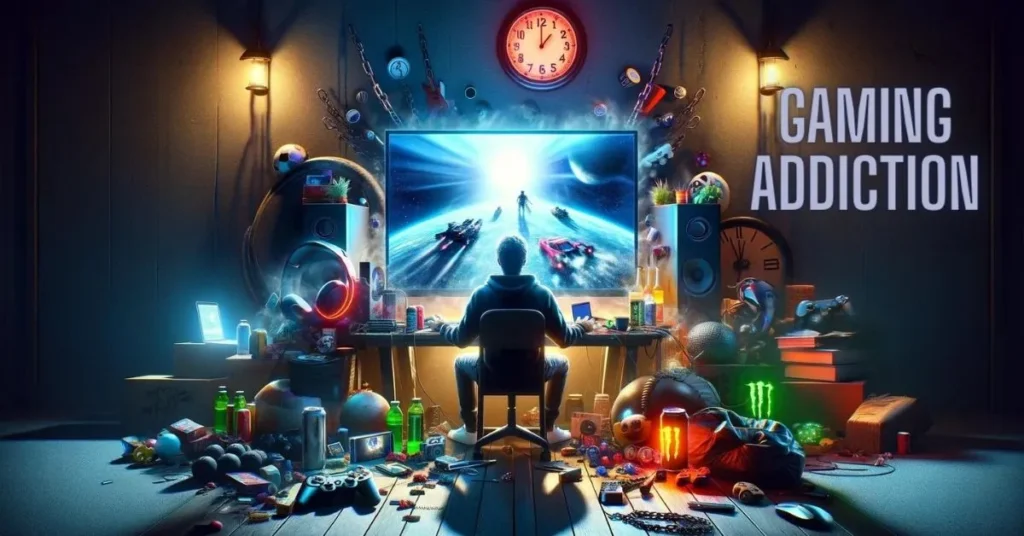Video gaming has become an increasingly popular form of entertainment, with millions worldwide engaging in this pastime. While gaming can be fun and engaging, it can also become addictive for some individuals. Gaming addiction, also known as internet gaming disorder, is a growing concern that can have significant negative impacts on an individual’s mental health, physical well-being, and social relationships. In this article, we will explore the concept of gaming addiction, its causes, symptoms, and practical strategies for addressing this issue.
Contents
What is Gaming Addiction?
Gaming addiction is a behavioral disorder characterized by an excessive and uncontrolled preoccupation with playing video games. If you’re an avid gamer and find yourself constantly thinking about your next gaming session or browsing websites like Sobat Gaming for the latest gaming news, it could be a sign of addiction. It is often associated with a loss of control, prioritizing gaming over other essential aspects of life such as work, study, or personal relationships, and experiencing withdrawal symptoms when unable to engage in gaming activities.
Causes of Gaming Addiction
Escapism and Stress Relief
For some individuals, gaming serves as a means of escape from real-life stressors or emotional difficulties. The immersive nature of video games can provide a reprieve from problems, leading to excessive gaming as a coping mechanism.
Dopamine Release and Reward System
Playing video games can trigger the release of dopamine, a neurotransmitter associated with pleasure and reward. This reinforces the desire to continue gaming, leading to the development of addictive patterns.
Social Connections and Sense of Achievement
Online gaming communities can provide a sense of belonging and social connection, which can be particularly appealing for individuals who struggle with social interactions in the real world. Additionally, the achievements and rewards offered in video games can create a sense of accomplishment and validation.
Symptoms of Gaming Addiction
Preoccupation and Obsessive Thoughts
Individuals with gaming addiction may find themselves constantly thinking about gaming, even when they are not playing. They may plan their daily activities around gaming sessions and become irritable or restless when unable to play.
Loss of Control and Neglect of Responsibilities
Gaming addicts often struggle to control the amount of time they spend playing games, neglecting essential responsibilities such as work, school, or personal hygiene.
Continued Gaming Despite Negative Consequences
Despite experiencing negative consequences, such as strained relationships, poor academic or job performance, or financial difficulties, gaming addicts may continue to prioritize gaming over other essential aspects of their lives.
Withdrawal Symptoms and Tolerance
When unable to engage in gaming activities, individuals with gaming addiction may experience withdrawal symptoms such as anxiety, irritability, or mood swings. They may also develop a tolerance, requiring longer gaming sessions or more challenging games to achieve the desired level of satisfaction.
Addressing Gaming Addiction
Seeking Professional Help
Seeking professional help from a therapist or counselor specializing in gaming addiction can be a practical first step. They can provide guidance, support, and evidence-based treatments to address the underlying issues contributing to the addiction.
Setting Limits and Developing Healthy Habits
Establishing clear boundaries and limits around gaming can help you regain control. This may involve setting time limits, scheduling breaks, or finding alternative activities outside gaming.
Building Social Connections and Support Systems
Developing meaningful social connections and support systems outside of the gaming world can provide a sense of belonging and fulfillment, reducing the reliance on gaming as a social interaction.
Addressing Underlying Mental Health Issues
In some cases, gaming addiction may be a symptom or coping mechanism for underlying mental health issues such as depression, anxiety, or trauma. Seeking professional help to address these underlying conditions can be crucial in overcoming gaming addiction.
Promoting Healthy Coping Mechanisms
Developing healthy coping mechanisms, such as exercise, mindfulness practices, or engaging in hobbies and interests outside of gaming, can provide alternative outlets for stress relief and personal fulfillment.
Conclusion
Gaming addiction is a growing concern that can have significant negative impacts on an individual’s life. By understanding the causes, symptoms, and practical strategies for addressing this issue, individuals can take proactive steps to maintain a healthy balance between gaming and other aspects of life. Seeking professional help, setting limits, building social connections, addressing underlying mental health issues, and promoting healthy coping mechanisms are all essential steps in overcoming gaming addiction and regaining control over one’s life.

